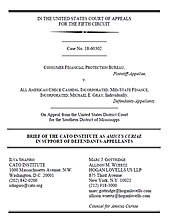Learn more about Cato’s Amicus Briefs Program.
Just as no single person can be judge, jury, and executioner, no single bureaucratic agency head may create rules and enforce them, and do so without meaningful oversight from Congress or the president. In a case before the U.S. Court of Appeals to the Fifth Circuit, Cato has filed a brief arguing that the director of the Consumer Finance Protection Bureau has been granted both rule-making and rule-enforcing powers far beyond what is constitutionally permissible—and the vague and arbitrary way in which he’s been using them violates the due-process protections of the Fifth Amendment.
Because the structure of the Constitution is so important in preserving the checks and balances between branches of government, courts have looked harshly on schemes that “delegate” those powers away from where constitutional text places them. The president, for instance, may appoint someone to execute his powers over a certain area of law, such as the attorney general as head of the justice department. This doesn’t violate the “nondelegation” doctrine because the president maintains control; he can direct a general policy of prosecution or non-prosecution and he can fire the AG. So long as the president has the power to remove an officer, the power delegated remains ultimately in presidential hands.
The CFPB structure is unique; it creates a single director as head of the organization, but insulates him from presidential removal except “for cause.” The president therefore has no control over this segment of law enforcement. The agency isn’t accountable to Congress either, even though Congress typically has the “power of the purse” and can deny funds to an executive department if it believes executive powers are being abused. Not so with the CFPB, which has independent access to Federal Reserve funds, without needing to seek approval from Congress or the Federal Reserve.
In addition to being financially independent from Congress and insulated from the President, the CFPB retains a tyrannical mix of legislative freedom and executive discretion. The Dodd-Frank Act grants the agency power to punish “unfair”, “deceptive,” and “abusive” practices, but also grants the CFPB’s director the power to define those terms. To date, the director has declined to clearly define those terms, choosing to define them on a “case by case” basis. But he has begun prosecuting people anyway, which is a glaring violation of due process.
